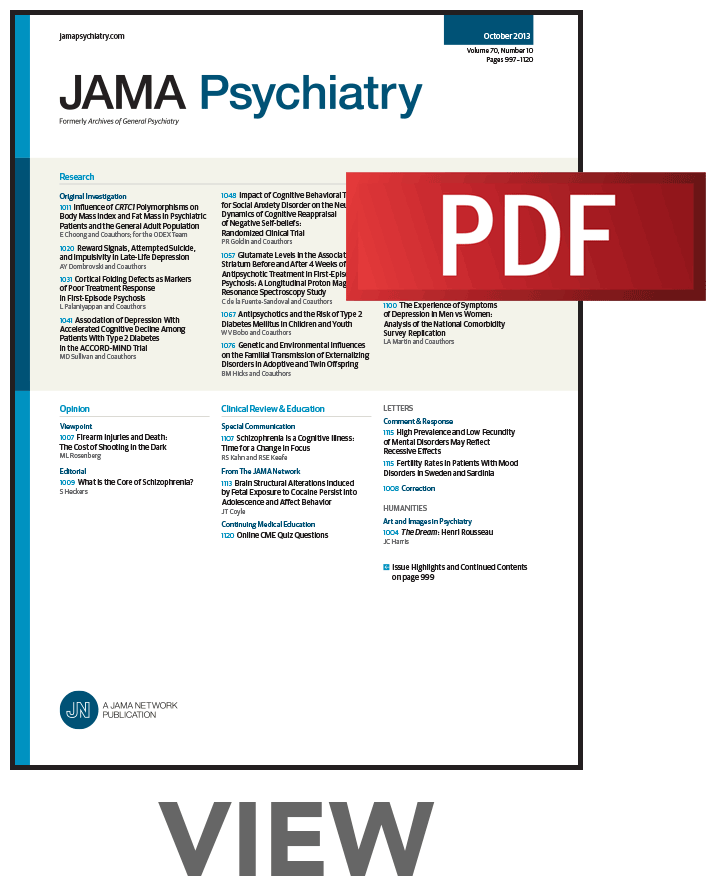Data-Driven Contingency Management Incentive Magnitudes: A Review.
IF 17.1
1区 医学
Q1 PSYCHIATRY
引用次数: 0
Abstract
Importance Interest in contingency management (CM) as a treatment for opioid and stimulant use disorders has increased because of the ongoing dual opioid/stimulant crisis, rising stimulant drug deaths, and demand for effective treatments for stimulant use disorder. The success of the US Department of Veterans Affairs nationwide rollout and the launch of California's Recovery Incentives Program provide evidence that this treatment can be translated into effective clinical practice. Objective To provide data-driven inflation-adjusted incentive estimates for modern CM protocols that can be customized for intervention duration. It is essential for CM protocols implemented in clinical care to use efficacious, research-supported parameters, including incentive magnitude. Evidence Review This review included 112 published CM protocols that involved reinforcement of stimulant- and/or opioid-negative urine drug tests, categorized each protocol in terms of impact (small/medium/large effect size) relative to a non-CM comparator condition, and computed weekly inflation-adjusted incentive magnitudes for voucher- and prize-based CM protocols. Findings Drawn from protocols with medium to large impacts on patient outcomes, weekly median magnitude estimates are $128/week for voucher protocols and $55/week for prize protocols. For the most common duration of 12 weeks, these estimates translate to $1536 for voucher and $660 for prize protocols. Conclusions and Relevance These incentive magnitude estimates can be used to inform clinical, policy, and advocacy related to CM implementation. Practical suggestions (eg, starting values, escalation) for building protocols that meet these incentive magnitudes are provided and implications are discussed.数据驱动的应急管理激励大小:综述。
由于持续的阿片类药物/兴奋剂双重危机,兴奋剂药物死亡人数上升,以及对兴奋剂使用障碍有效治疗的需求,对应急管理(CM)作为阿片类药物和兴奋剂使用障碍治疗的兴趣增加。美国退伍军人事务部在全国范围内的成功推广和加州康复激励计划的启动提供了证据,证明这种治疗可以转化为有效的临床实践。目的为现代CM方案提供数据驱动的经通胀调整的激励估计,并可根据干预时间进行定制。在临床护理中实施CM方案时,必须使用有效的、研究支持的参数,包括激励幅度。本综述纳入了112项涉及兴奋剂和/或阿片类药物阴性尿检强化的已发表的CM方案,根据相对于非CM比较条件的影响(小/中/大效应量)对每个方案进行了分类,并计算了基于代金券和奖励的CM方案的每周通货膨胀调整的激励幅度。研究结果:从对患者预后有中等到较大影响的方案中得出,每周中位数估计为,代金券方案为128美元/周,奖励方案为55美元/周。对于最常见的12周期间,这些估计数为代金券1536美元和奖品议定书660美元。结论和相关性这些激励大小的估计可以用来告知临床,政策和宣传相关的CM实施。为建立满足这些激励幅度的协议提供了实际建议(例如,起始值,升级),并讨论了其含义。
本文章由计算机程序翻译,如有差异,请以英文原文为准。
求助全文
约1分钟内获得全文
求助全文
来源期刊

JAMA Psychiatry
PSYCHIATRY-
CiteScore
30.60
自引率
1.90%
发文量
233
期刊介绍:
JAMA Psychiatry is a global, peer-reviewed journal catering to clinicians, scholars, and research scientists in psychiatry, mental health, behavioral science, and related fields. The Archives of Neurology & Psychiatry originated in 1919, splitting into two journals in 1959: Archives of Neurology and Archives of General Psychiatry. In 2013, these evolved into JAMA Neurology and JAMA Psychiatry, respectively. JAMA Psychiatry is affiliated with the JAMA Network, a group of peer-reviewed medical and specialty publications.
 求助内容:
求助内容: 应助结果提醒方式:
应助结果提醒方式:


